- Home
- Micheal Maxwell
Cole Dust Cole Page 10
Cole Dust Cole Read online
Page 10
NINE
Wednesday morning Cole woke to a cloudy sky. He dreamed of sailboats on and off all night and awakened at dawn to the dull rumble of thunder to the south. The radio weatherman said there was a chance of rain in the late afternoon. He pulled on a sweater and started downstairs. Instead, though, he turned and went up into the attic.
He tried lifting one end of the trunk and decided it was still a bit heavy to lug down the stairs, so he took a double armload of notebooks and went to the kitchen. The table was nearly covered with the black and white covered notebooks and the new deposit made using the table all but impossible. Cole sorted the books into piles by month and date then was struck with the idea of arranging them on the shelves in the living room.
The inspiration gave Cole a shot of energy. He made three trips back to the attic, now all the notebooks were on the floor in the living room. Starting with the notebooks on the kitchen table he set about to arrange his library on the bookcases. All together there were one hundred and seventy six notebooks spanning forty-four years. Shades and hues that varied, colors that were faded, and styles that thickened, shrank, ebbed and fell, like a Wall Street bar graph. Some were in remarkable shape for their age and some looked like they wandered in the desert for forty years. The temptation was almost unbearable to begin reading some of the books. He saw the label for November 1931 and wanted to read George’s telling of the birth of his only son, Cole’s father. He stopped and almost turned to March when he came to 1949, the year his parents were married, but he promised himself not to read ahead.
The notebooks were a history, the telling of a life, and like a life, no one can look into its future. Cole was determined to watch the story of George Sage unfold as it happened. He did not want knowledge of events to prejudice him to what came before. He was getting to know a man and his times. He fought hard to suppress the stories he heard as a boy that continually tried to interject themselves into his reading. His mother’s snide remarks and his grandmother’s “before you were born” stories could not be allowed to compete with George’s firsthand account of the events that became his family’s personal folklore.
Cole stood back and admired his work. Unlike his bookcases at home there was plenty of space to organize. In the left side bookcase he placed the notebooks he read on the top shelf. On the right bookcase in date order he placed all the books yet to be read. Outside, the sound of rain gently dripping from the eaves drew Cole’s thoughts away from the notebooks.
Cole fried an egg then melted cheese on a piece of ham and put it all between two slices of bread he toasted under the broiler. The heat from the oven warmed the kitchen and made Cole think of his San Francisco home. He took his sandwich and went to the front porch. The sky was dark and a cool breeze was blowing in from the south. The rain certainly was not what he needed. The dry wood and crackly paint was easy for scraping away as it was, but the rain would swell and soften the dry siding and make the preparation for fresh paint much more difficult. Cole glanced at his watch, ten-thirty; Kelly would land in two hours.
After straightening up the clutter in the kitchen and wiping down the sinks and toilets in the bathrooms, Cole returned to the living room and took the first notebook off his shelf of unread volumes. The first entry was marked in all capital letters: THE LAST DAY OF SCHOOL.
June 5 1914
I have successfully completed grade school. We had a picnic at the lake and a field day to celebrate the last day of school. I won the sack race! Papa brought Effie out to the lake and all the kids were happy to see her. Mr. Calvin did not go to the lake, so it was like old times except Effie was in a wheel chair instead of taking part in the games. I asked Marie Louise Nelson to eat lunch with me and she said yes. I believe she is the nicest person I have ever met. We enjoyed deviled egg and ham sandwiches under a cottonwood tree. She said that she would save a dance for me at tonight’s graduation dance.
Lloyd got in a fight with Tom Wilkerson. Lloyd had to be taken to the doctor because Tom broke his nose. Tom called Lloyd “Trash Boy” and Lloyd said, “At least my ma ain’t a whore.” Then the fight started. I missed the fight because I was having lunch with Marie Louise, but it was worth it.
The graduation ceremony was boring except when Marie Louise Nelson sang “O Beautiful is Our Flag”. Effie was given flowers paid for by those of us graduating. She said nice things about our school and said she would be back in the fall. This year we had twenty-three graduates, the biggest class ever. Mr. Calvin officially welcomed the graduates to the high school. I hope I don’t get him as a teacher again!
Tom and Lloyd were not allowed to attend the dance but Lloyd stood under a tree outside the hall and smoked cigarettes. Millie McPherson said some of the boys had been drinking. She said Lloyd had swiped a bottle from his pa’s cupboard. He’s a real card.
June 12
I am writing this on a train headed for Kansas. I will not be there for harvest this year because I have taken a job building houses. The work will begin on the Monday after Independence Day. I am going to stop writing because I am feeling sick.
The chimes of the cell phone clanged from the kitchen. On the fifth ring Cole answered as he bounded down the porch steps into the rain.
“Chicks and ducks and geese better scurry...” Kelly sang over the phone.
“Hey, I can hear you!” Cole said a bit too loud.
“I just got the rental car and I’m on my way.”
“How is the weather there? It’s raining here.”
“You’re kidding! Bright and shiny here in old OKC. I can’t wait to see you; it seems like a week since you’ve been gone.”
“Very funny. Big plans for dinner; don’t eat a bunch of junk in the car.”
“Traffic is getting ugly; I better use both hands. See you in a couple of hours.” Kelly again burst into song, “The wheels are yeller, the upholstery’s brown, the dashboard’s genuine leather...” The call was disconnected.
The rain let up and Cole took a deep breath of the cool clean air. In the south the sky was clearing. A mockingbird sang from atop the TV antenna and the gutters dripped on the corners of the house and left craters in the soft dirt below.
Cole returned to the living room, picked up the notebook he had been reading and flopped down on the couch.
July 4, 1914
I spent the day buying firecrackers and setting them off. Tonight will be the big celebration at the Rodeo Grounds. Lloyd said to save some money and we would buy a bottle of whiskey from Billy Talbot, a colored fellow who works for Lloyd’s father. I’m not so sure this is a good idea, but Lloyd says I’m going to love getting a little tipsy.
At eight o’clock Lloyd and a boy I did not know came by our house. Papa had a headache and had gone to bed. I skipped out the back door before Mama could ask any questions. I gave Lloyd my fifty cents and we went to meet Billy Talbot. When we got to the livery stable Billy was waiting with two other colored men. I recognized one from the hangin’ but I did’t say anything.
The liquor burned my throat. Jeremiah, the fellow Lloyd brought along, drank more than his share of the bottle and got in a rough with Lloyd. Jeremiah pulled out a knife and I ran. As I ran I began to feel dizzy. I stopped by a roasted corn booth and closed my eyes and leaned back on the wall. When I opened my eyes there stood Alma, Lloyd’s sister.
“What are you doin’ leaning there?”
“Jeremiah pulled a knife on Lloyd and I ran away.”
“You smell like liquor,” She said, as she moved very close to me.
“I had a bit.”
Before I could move she slipped her hand around the back of my neck and kissed me hard on the mouth. I tried to turn away but she pressed against me and kissed me harder.
“What are you doing?” I said, when she finally pulled back.
“You like it, don’t cha? Here.” She took my hand and pressed it against her breast. Before I could move she kissed me again.
“What the hell you two doin’?” Lloyd laughed from behind h
er.
“George is my new beau.”
“Like hell I am,” I said, squirming away.
Just then I saw Marie Louise Nelson on the far side of the street. Without saying a word I left Lloyd and his nasty sister laughing behind the corn booth and ran up the street.
“Good evening, Marie Louise.” I was still breathing hard.
“Why, George Sage, how nice to see you. Mother, this is George Sage, one of my classmates.” I felt like she was introducing me to the Queen of England.
“Yes, I remember. How are you George?” Mrs. Nelson responded.
I never realized how much different the Nelsons sounded than the rest of us. As we walked along I felt like my tongue was swelled up. My words were sounding funny to me so I didn’t talk a whole lot. I had a sack of horehound candy in my pocket and put two pieces in my mouth and offered Marie Louise and her mother a piece. I hoped it covered the smell of the whiskey.
When Mr. Nelson came back from wherever he had been, I was again introduced.
“It was nice to meet you,” said Mr. Nelson, and from the way he said it I knew he was saying good-bye.
Marie Louise gave me a sad look and then the three of them turned and left me standing in front of the fishing booth. I heard laughing from behind me and it was Lloyd and Alma. I went to the fireworks display by myself. I went home and swore I would never drink liquor again.
The promise was not to be kept. As a boy, Cole was often lectured about the evils of alcohol, and his grandfather’s life was held up as an example of the destruction it can bring. It was a sad foreshadowing of what was to come. Cole shut the notebook and closed his eyes. He pictured Orvin almost a hundred years ago and the people parading along the streets. Within a month a war would start in Europe. The assassination of an archduke, in a country most of the people of Orvin ever heard of, just six days before had nothing to do with the Fourth of July celebration and so the people on the street didn’t give it a thought. If George was born in 1900, Cole thought, why didn’t he fight in World War I?
TEN
In the distance a horn was bursting out a quick loud pattern. Cole started awake. He dozed off on the couch. The horn must be Kelly. He jumped to his feet and ran to the window. At the end of the drive was a silver Mustang convertible. Standing in the seat taking in the breadth and depth of the farm was indeed Kelly.
Cole stood on the porch and waved both arms like a man on a desert island signaling a passing ship.
“I made it!” Kelly yelled as she slid down the back of the seat.
Cole walked out into the field in front of the fence. Kelly was wearing a bright green paisley scarf and a big pair of thick-rimmed sunglasses. For a moment he thought of Ellie and how she wore much the same kind of scarf and glasses when she rode in his sports car so many years ago.
“You look like an Italian movie star!”
“And you look like a man out standing in his field!”
Cole laughed. He always played the straight man to Kelly without realizing it. As she pushed the sunglasses back on her head, her youthful beauty stunned him. Few women her age retained the glow and vibrant energy that Kelly projected. Cole watched as she got out of the car; she wore a simple tank top and peasant skirt of pale green but it looked so elegant against her tanned skin he couldn’t help but heave a great sigh.
Kelly held out both hands and Cole took them in his. She rose up on tiptoes and gave him an effected glamour girl peck on both cheeks before throwing her arms around his neck for a long embrace. She leaned back against Cole’s arms and gave him a kiss. She pulled back, looked deep into his eyes and kissed him again.
“You did miss me.”
“I did. I’m glad you’re here.”
Kelly moved away from Cole’s embrace and faced the house. “You’re right Cole, it is a handsome house. Give me the tour, just like when you arrived.”
Cole pointed out the fences and how the tumbleweeds covered the land. They walked back to the pond and Kelly asked if there were any fish in it. To Cole’s surprise he never even considered the presence of fish. Kelly dipped her hands in the horse trough and flicked water at Cole.
“OK, now the house,” she said, as she took Cole’s hand.
Cole walked her through the house describing what he saw when he first arrived. He spun tales of dust and dirt, rats and spider webs, and the pit behind the house. He pointed out the work he did in the last few days. On the back porch he showed her where the preserves and newspapers were stacked. In the kitchen the subject was rat damage. The downstairs bathroom glistened from his earlier polishing and he was pleased with his effort.
Upstairs he showed her the bedrooms, bathroom and finally the attic and the trunk. He began telling her the story of finding the notebooks and finished in the living room with the shelves where he arranged the notebooks.
“He never stopped,” Kelly said, with a note of admiration in her voice.
“There are gaps. I noticed several times there would be what probably were one maybe two notebooks missing. All in all the blanks are few.”
“So what have you learned? I mean are there any great revelations?”
“Well,” Cole reflected, “it’s not so much a case of what I have learned but more who I’ve met. My grandfather had a pretty good-sized family. Through the pages he mentions all his brothers and sisters. He was the baby of the family by nearly twenty years so his siblings were more like aunts or uncles. So far I’ve read to 1914; George is only fourteen. He has a sister, Effie, who lives with the family. She never married, at least so far. She’s a schoolteacher and a sad and lonely woman. George tells of her crying in the night.”
“Can I read them?”
“Of course, but a lot of it is pretty dull going.” Cole smiled and then a wave of enthusiasm came over him. “But then, then there are the parts of the story that just leap from the page. He had such a way of telling a story. And he’s only a kid! I can’t wait to read his accounts of his life as a man. Thing is Kelly,” Cole slowed, “my dad never talked much about his upbringing. My mother had little affection for his family. By the time I was five my grandfather had died. My grandmother went to live with her daughter and I only saw her once or twice. So this experience, these notebooks, is a window into a history, a tradition, which I am from, yet never have known of. I had no idea my great-grandfather was a banker. My great-aunts and uncles were teachers, farmers, and one aunt married and moved to Chicago! She was never seen again; sent Christmas cards, that’s it. So I could have family living in Chicago and I never knew it.”
Kelly gave Cole a sweet smile and ran her hand along the spines of the notebooks. She was seeing a side of Cole she never knew. He was like a kid discovering that books contain more than words. He connected with something unexpected whose importance was yet to be understood or whose impact measured. In this moment she understood that more than the tangible value of the house and land, Cole inherited a foundation, a history and a pedigree, that no matter how it ended or what the story exposed, the characters were part of his heredity, his blood, his genetic make-up. Cole would return a man with a family narrative.
“We will read every page,” Kelly said softly.
Cole looked at this woman who stood before him and sensed in her voice a deeper meaning. She heard his story. She knew of his victories and his defeats. They shared the gift of a grandchild. After the fact, after the joy and expectations, the child shared their blood. Her great loss, his reconnection followed by loss and discovery of a daughter and family he had never known, the discovery that led him to her. The swirl of life’s web brought to Cole a cocoon that wrapped him in the soft threads of care, concern and love. As he looked at Kelly, he realized he did not want that thread to ever break.
“We can do that. But I have taken a pledge to only read them when I have finished my work. Of course I do have to retake the pledge three or four times a day.”
“So where do we start?”
“First one, I guess.”
&nb
sp; “No silly, I meant where do we start, what job do we do first?”
“The rain has kind of stopped the outdoor work for today. I guess you could help me decide what to do with the interior.”
“I was hoping you would ask,” Kelly said with obvious enthusiasm for the project.
“Keep in mind I have no intention of living here, so I don’t want the Martha Stewart plan, I need simple and cheap.”
“Simple and cheap doesn’t have to mean tacky. We can do all kinds of cute things without spending a bundle.”
“Then the job’s yours,” Cole said, arms out and palms up toward the kitchen.
“Ours,” Kelly said, reaching out and taking his hand.
By five o’clock Kelly created sketches and notes for every room in the house. Cole was charmed by her approach to the job but, if he was being honest, he was bored beyond words. Blue, pale blue, powder blue and robin’s egg blue were all blue to Cole. Fresh paint meant clean. All he really wanted was a clean fresh house inside and out with the intent of selling it as quickly as he could. White would have suited him fine. But he resigned himself to doing whatever Kelly wanted, if it were within reason, and more importantly, within his undetermined budget.
“What do you say we wrap this up and go to dinner?”
“I am very proud of how long you were able to maintain your façade of interest. You glazed over and have been floating in the river of no return boredom for the last hour. Thank you.” Kelly gave him her all knowing smile and he ran for his keys.
The tires of the SUV scraped the curb as Cole pulled up in front of Big Pete’s Cafeteria Style Deep Pit Barbeque. He couldn’t help but glance over at Kelly to see her reaction.
“I take it we are not dining on Nuevo Latino cuisine this evening.”
“Not exactly.” Cole chuckled as he got out of the car.
The place was crowded and noisy as Cole guided Kelly under the clanging cowbell above the front door. A smile slowly crept across Kelly’s face as she slowly took in the room.

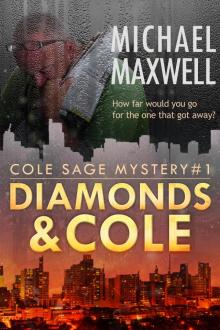 Diamonds and Cole: Cole Sage Mystery #1
Diamonds and Cole: Cole Sage Mystery #1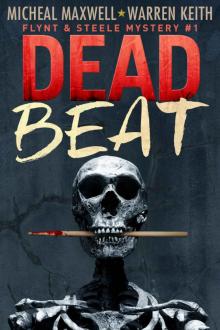 Dead Beat
Dead Beat![[Cole Sage 03.0] Helix of Cole Read online](http://i1.bookreadfree.com/28/cole_sage_03_0_helix_of_cole_preview.jpg) [Cole Sage 03.0] Helix of Cole
[Cole Sage 03.0] Helix of Cole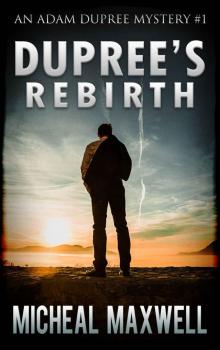 Dupree's Rebirth
Dupree's Rebirth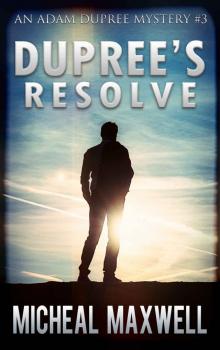 Dupree's Resolve
Dupree's Resolve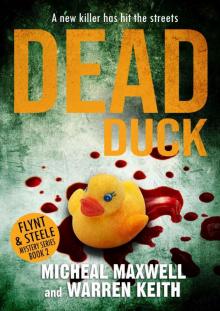 Dead Duck
Dead Duck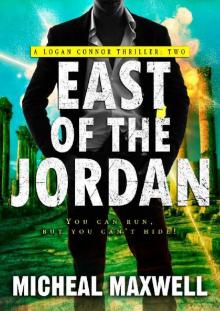 East of the Jordan (A Logan Connor Thriller Book 2)
East of the Jordan (A Logan Connor Thriller Book 2)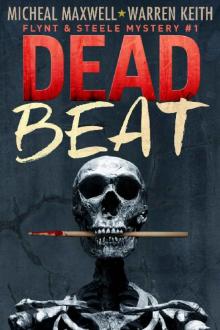 Dead Beat (Flynt and Steele Mystery Book 1)
Dead Beat (Flynt and Steele Mystery Book 1)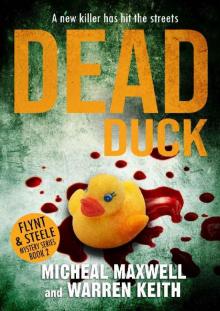 Dead Duck (Flynt & Steele Mysteries Book 2)
Dead Duck (Flynt & Steele Mysteries Book 2)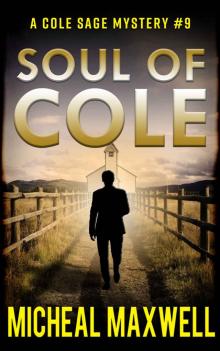 Soul of Cole
Soul of Cole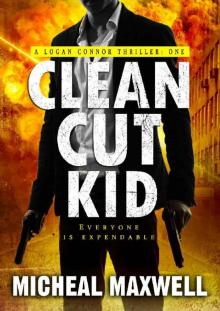 Clean Cut Kid (A Logan Connor Thriller Book 1)
Clean Cut Kid (A Logan Connor Thriller Book 1)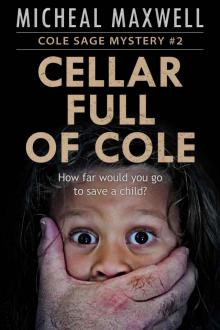 Cellar Full of Cole: A Cole Sage Mystery #2
Cellar Full of Cole: A Cole Sage Mystery #2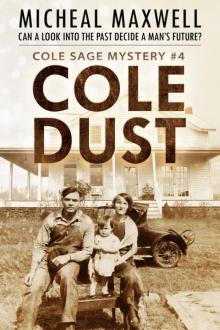 Cole Dust Cole
Cole Dust Cole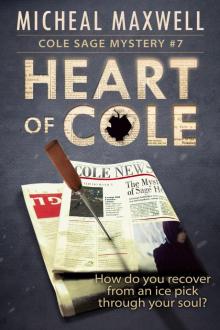 Heart of Cole
Heart of Cole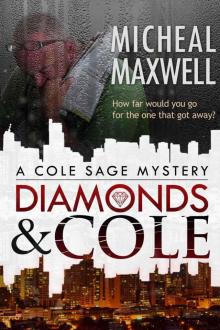 Diamonds and Cole: A Cole Sage Mystery
Diamonds and Cole: A Cole Sage Mystery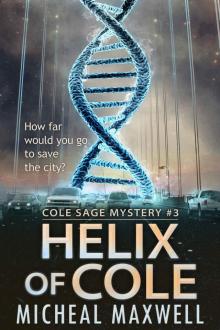 Helix of Cole
Helix of Cole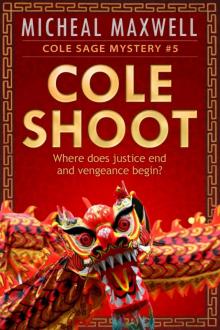 Cole Shoot
Cole Shoot